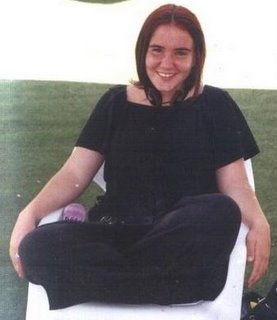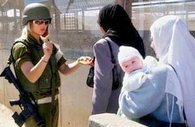Uri Avnery
20.5.06
Who's guilty? The victim of courseTHOSE WHO listened to the radio news last Saturday heard a stunning report: that Muhammad Abu-Ter and Uri Avnery had barricaded themselves together in a private home in a-Ram.
The very fact that these two - the No. 2 man of Hamas and the notorious Israeli leftist - were together was already shocking enough. But the fact that they had invaded the home of an innocent Palestinian family and barricaded themselves there, like criminals fleeing from the police, was even more staggering.
This false news item would, perhaps, deserve no special mention, if it were not typical of the whole media coverage, not only of this specific demonstration, but of all joint demonstrations of Israeli peace activists and Palestinians. More than that, it throws light on the close connection between the Israeli media and the occupation regime. Without this connection, it is doubtful if the occupation could have lasted for the 39 years it has so far.
Therefore it is worthwhile to analyse the events in detail.
FIRST OF all, the background. A-Ram (that's how the name is spoken, though its written form is al-Ram) was a small Palestinian village north of Jerusalem, on the highway to Ramallah. Since the "unification" of Jerusalem in 1967, the village has become much bigger. The reason: while the Palestinian population doubles every 18 years or so, it is well-nigh impossible to obtain a building permit in East Jerusalem. For lack of an alternative, many Arab East Jerusalemites build homes for their enlarged families in the surrounding villages. A-Ram has in fact become a town, but most of its 50 thousand inhabitants have Jerusalem (i.e. Israeli) identity cards, and their life revolves around Jerusalem. Their work, health services and universities are there. Officially, however, the town belongs to the occupied territories.
When it was decided to build the Separation Wall around Jerusalem, the plan was to cut a-Ram off from the city. Worse: the path of the Wall passes right down the middle of the main street - so that it does not separate between Palestinians and Israelis, but mostly between Palestinians and Palestinians.
To get an idea: it is as if a wall had been built in the middle of Broadway, from 42nd Street to Harlem. Or in the middle of the Champs-Elysees, from the Place de la Concorde to the Arc de Triomphe. Or in Berlin, in the middle of the Kurfuerstendamm, from the Memorial Church to the Messegelaende. The two parts of the city and its neighborhoods would be separated by a nine meter high wall.
When this was only in the planning stage, the inhabitants held a number of non-violent demonstrations. To all of them, Israeli peace activists were invited and came. But in the meantime, the monstrous Wall has become reality. It cuts off the holders of Israeli identity cards from the city where their businesses and places of employment are located. It cuts off the pupils from their schools, which are only 100 meters away on the other side of the wall. Not to mention the students who are separated from their universities; the sick, separated from their hospitals; even the dead, separated from their cemeteries.
Now the wall is nearing completion. It is still under discussion in the Supreme Court, but experience shows that that is pretty hopeless. One can still reach the town through an army checkpoint, but even this hole is about to be plugged: the Wall will close off this place, too. In the meantime, in some places there is still a high fence instead of the concrete structure, pending the conclusion of the court proceedings.
In order to protest this, a large Palestinian-Israeli event was planned. It was to be a march in the main street, along the Wall (on the Palestinian side, of course), from the town center to an improvised tribune, where speeches were to be made.
The details were worked out in three planning sessions. In order to underline the non-violent character of the event, it was decided that the schoolchildren, whose schools have been cut off, would march at the head in their school uniforms, their satchels on their backs, accompanied by their teachers. Also, an alternative route was planned for them in case there would be a danger of a clash with the army.
WHEN WE - about 300 Israeli activists of several peace movements - were approaching a-Ram, we were informed that large forces were waiting to block our passage at the checkpoint. Going around them, we reached the wall on the "Israeli" side. At this point there stands a high fence, instead of the concrete structure. We breached it and many demonstrators succeeded in crossing to the "Palestinian" side, into a-Ram, before the army, which was surprised by this move, succeeded in rushing up reinforcements.
In the meantime, the Palestinian demonstration had already started on its way, exactly as planned - at the head a group of boy-scout drummers with their flags, after them the small children of the first class, behind them the other schoolchildren, from small to big, then the main demonstration with posters and flags, led by a row of leaders of all Palestinian parties. The Israeli activists mingled with the Palestinians in order to demonstrate solidarity, and I was invited to join the front row.
That way I found myself walking between Abu-Ter, the Hamas leader who has become famous in Israel not least because of his brightly shining red beard, and the Palestinian minister for Jerusalem affairs, Abu Arafeh, also a Hamas member. Next to them there were the leaders of Fatah, the Popular Front, the Democratic Front and the People's (ex-Communist) Party. We marched arm in arm, and it seemed that the demonstration would pass off peacefully. And then, suddenly, we saw that the road ahead of us was blocked by a large contingent of soldiers and policemen who were waiting for us - rows of soldiers heavily armed from head to foot, in front of them mounted police on their horses and behind them army Humvees.
The first concern was the safety of the children. Their teachers led them into a side street, and we marched slowly on, on our way to the tribune. There could not have been a less threatening sight than the row of notables, arm in arm, walking in front.
ABOUT WHAT happened then I can testify as an eye-witness, and I am prepared to undergo any lie-detector test:
When we were about 50 meters from the concentration of soldiers and horses in the main street of a-Ram, a voice from a megaphone announced that the area had been declared a "Closed Military Zone" and that our demonstration was illegal. While we were standing, facing the soldiers, a huge salvo of tear gas canisters suddenly rained down on us. It was not preceded by any provocation.
Clouds of gas rose up between us, in front and behind. More salvos of stun grenades raised hell, and so we escaped to the nearby houses. I entered the nearest one and found myself in the company of Abu Ter, who received me with great friendliness. Our eyes were burning and tearful, and we could not talk much, but we decided to have a more meaningful conversation soon.
When the gas dispersed, we emerged to join the continuing demonstration. The activists formed again and again on the road, the policemen and soldiers attacked us again and again with tear gas and stun grenades, storming forward in waves - armed and well-protected soldiers, Humvees and police riders (wearing spurs, which are forbidden by Israeli laws for animal protection.)
Only at this stage - and that's the main thing! - did some local children and youngsters start to throw stones at the policemen - stones that could do no damage, since they fell short of the policemen, whose gas launchers have a far longer range. The demo organizers did their best to restrain them, but the anger of the youngsters against the soldiers who had invaded their town was too strong. After two hours, through a dialog with the senior police officer, contact was broken off and the Israeli activists returned home.
In the course of the event, 12 people - seven Palestinians and five Israelis - were detained. The Israelis were released a few hours later, the Palestinians remained in custody, with our lawyers dealing with their cases.
THAT WAS what happened in a-Ram. From then on, it was a story of the media.
The demonstration was widely covered, for two main reasons - the violence used and the meeting between me and Abu-Ter, which provided a piquant angle, since until now there has been no dialog between Hamas and Israelis. The news on all the three Israeli TV networks reported on the event extensively. That by itself was unusual - generally, most TV stations ignore our demonstrations, or devote a few seconds to them (except for a few reports by brave reporters.)
This time, too, no Israeli medium - TV, radio or newspaper - troubled to send reporters or photographers to the event, so there was no eyewitness Israeli media report from the scene. The TV stations showed clips taken by foreign networks. The reporters just made the most of what they heard from the police and us.
And lo and behold: all the media reported the same: the demonstrators had started the violence by throwing stones, two policemen "had been wounded and treated on the spot". (This lie repeats itself at all our demonstrations. One could begin to suspect that there are two policemen whose sole duties are to be "wounded and treated on the spot" each time we demonstrate.)
The police and army statements were outright lies. They knew in advance that our demonstration would be non-violent. I rely on them to have their agents at all our meetings, and we spoke about our preparations openly over the phone and in our e-mails. Two paid ads were published before the events in Haaretz. It is absolutely clear that the army and police had prepared in advance to suppress the demonstration by force. Otherwise they would not have brought horses and Humvees.
For many years we have witnessed the mendacity of official spokespersons, and I have no doubt that the reporters covering the occupied territories are aware of it. In some media, a sentence saying that "the demonstrators argue that it was the policemen who started the violence" appeared, but in all the media it was stressed that the violence started with us, so the police had no alternative but to react.
This is an Israeli tradition, which has unfortunately also been accepted by the international media: the Israeli security forces always "react" to the violence of the other side. But, curiously enough, the killed and wounded are mostly on the other side.
The small example of a-Ram illustrates what happens on a larger scale throughout the country: in matters concerning the army and police, the news in all the media, without exception, from Maariv to Haaretz, from Channel 1 to Channel 10, is indistinguishable from government propaganda. (with honorable exceptions in opinion columns and the op-ed pages.)
The chances of the victims getting fair coverage are close to nil. After all, the victims are always to blame.


